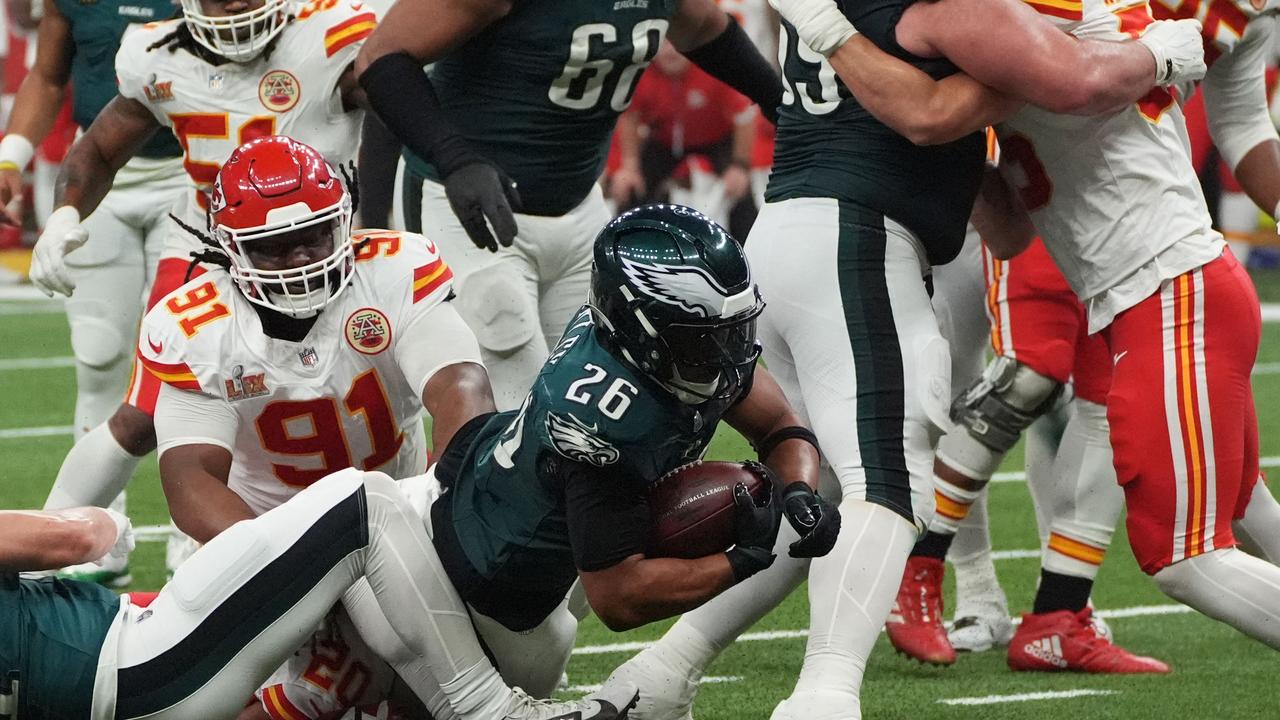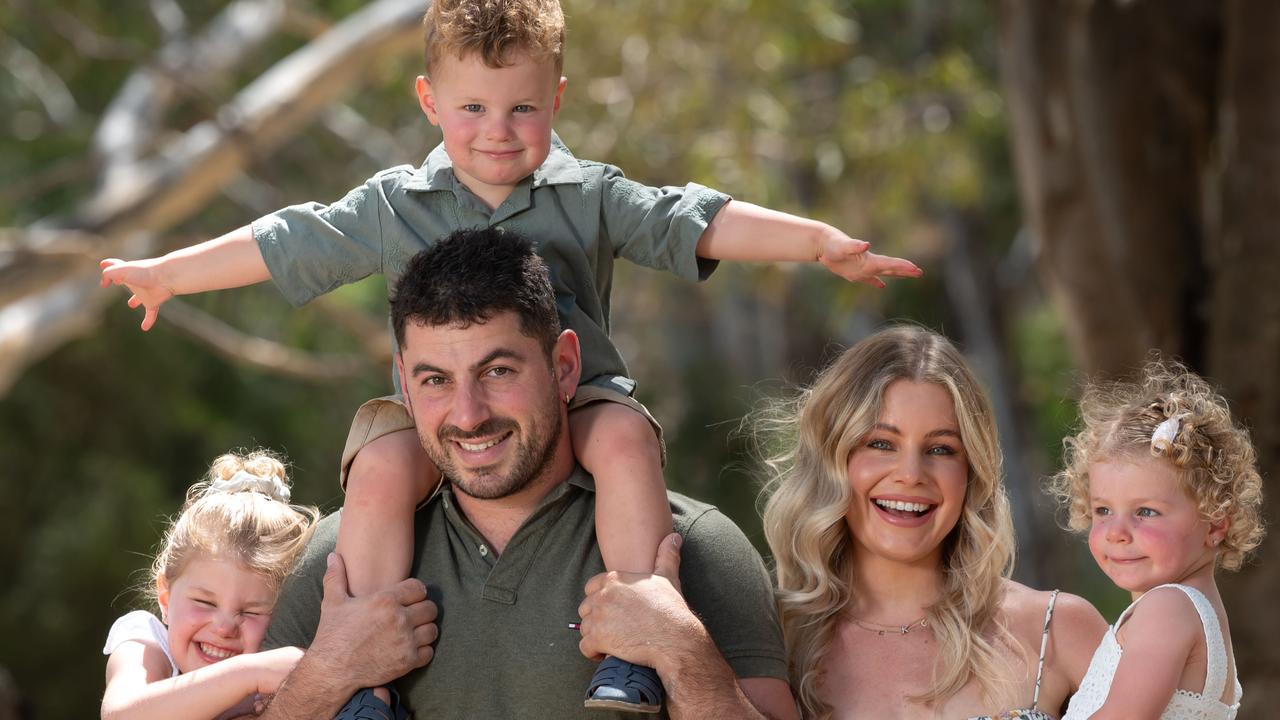Auslan interpreter says COVID made him famous
Adelaide’s ‘rock star’ sign language interpreter Mikey Webb shares the reality of being recognised outside of his role.
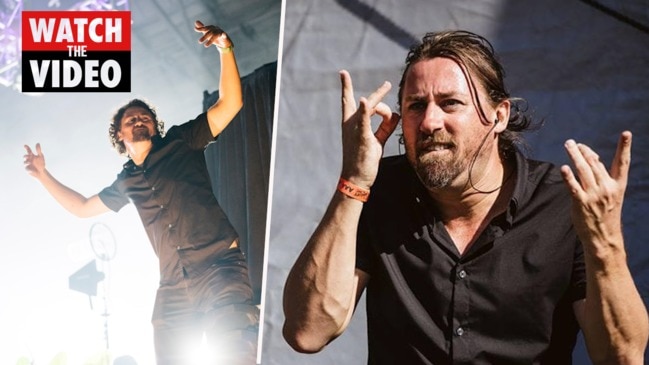
SA Weekend
Don't miss out on the headlines from SA Weekend. Followed categories will be added to My News.
Mikey Webb is used to being stopped by friendly, perhaps slightly perplexed, strangers asking, “Hey, aren’t you that guy on the news?”
Since their unprecedented inclusion in televised updates during natural disasters and the COVID crisis, sign language interpreters like Webb have become suburban celebrities thanks to regular appearances on our TV screens during such civic emergencies.
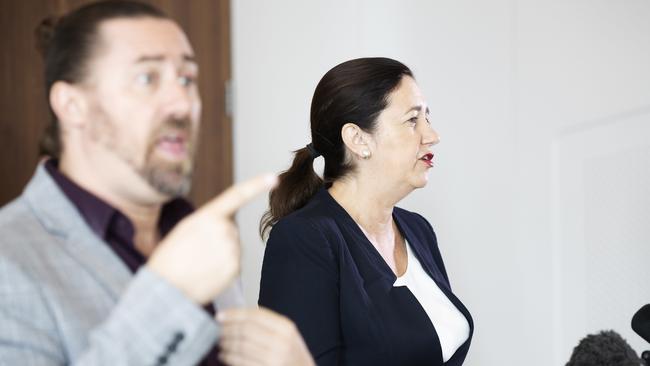
Now it’s a rare day Webb, known for his trademark man-bun, is not recognised – by both deaf and hearing people – in supermarket aisles, hospital elevators, commercial offices or even enjoying a coldie at his local pub. Guests at a friend’s recent wedding asked him for selfies, and he’s even found himself featured in internet memes and TikTok posts.
“It’s weird. It happens everywhere, and it’s happening more often lately. I feel strange for having this celebrity status thrust upon me – as have other interpreters around Australia - for just doing a job. To me, it’s just a basic right that deaf people get to have this information on the spot, right now,’’ says Webb, 38, who was born and raised in Adelaide but now lives in Brisbane.
But it’s not just as a news interpreter Webb is making a name for himself. Footage of him dancing, mouthing and signing lyrics on stage alongside an AC/DC tribute band at the 2020 Perth Festival went viral and made headlines.

The hearing population caught a glimpse of Webb’s passion, energy and skill, which the deaf community have known and loved for some time.
“If I wasn’t working (in corporate roles) today, I’d have worn my leather pants,’’ laughs Webb, straightening his suit jacket ready for SAWeekend’s photo shoot.
Meet Australia’s rock’n’roll translator.
SIGN LANGUAGE BEFORE HE COULD SPEAK
English is Webb’s second language. He was taught Auslan (Australian sign language) before he could speak. Not only are Webb’s parents, John, 71, and Fiona, 68, deaf, so is one of John’s two brothers, two of Fiona’s six sisters, and both set of grandparents and great-grandparents.
The Webb-Girke families are practically royalty in Adelaide’s deaf community, where Webb grew up alongside brother and fellow professional Auslan interpreter, Imran, 36, named for legendary cricketer and Pakistani prime minister Imran Khan.
A pioneer of deaf cricket in Australia, dad John was awarded an OAM in 2019 for his services to the sport as a player, coach, selector and mentor across more than 30 years. Webb’s maternal grandparents Elaine and Gilbert Girke were founding members of the Australian Association of the Deaf – now Deaf Australia - as well as other pivotal community organisations.
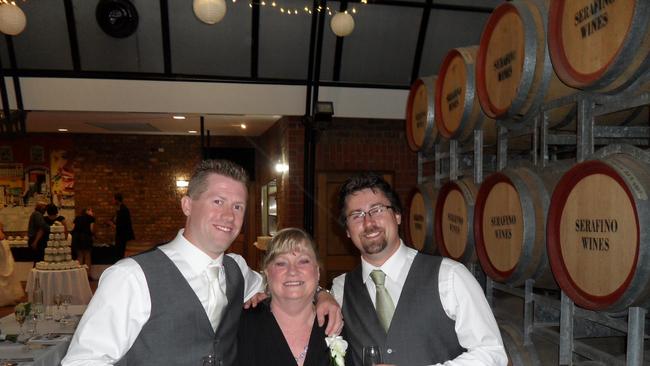
Gilbert was awarded an OAM in 2006 for his fundraising work, while fellow family member Bruce Muller was similarly recognised in 2014 for his work with Deaf Australia, Deaf Sports Australia and state bodies.
“Everyone signed in my family. I have a vivid memory – and we still chuckle about it – of going to kindy for the first time and this woman was trying to talk to dad, and I said, can’t you sign? She says, no, and I said, are you stupid?! Dad lip-read me and said, you can’t say that!’’ laughs Webb, a father of three hearing children.
Weekends were spent playing sport and socialising with other families in the deaf community, Webb – a state netballer - making friends with both deaf young people and other hearing Children of Deaf Adults, known as CODAs. Friday and Saturday nights were often spent seeing live bands or night-clubbing, where Webb would translate song lyrics for his mates. He shrugs. “It was just part of partying and it turned out I was good at it, somehow.’’
HIS ROCK STAR LIFE
Fast forward two decades and Webb – who denies having any musical or acting ambitions whatsoever - has shared the stage with the likes of U2, Aussie headliners at music festival Abilityfest and the casts of Grease, Cats, Dirty Dancing, Shrek and Bluey’s Big Play in some of Australia’s biggest venues.
It comes courtesy of his involvement with Auslan: Stage Left, a national non-profit organisation formed in 2013 to provide Auslan access to live events in the arts industry, including concerts, musicals, plays and comedy festivals. Spokesperson Melissa Smith says Webb is a firm favourite with the deaf community, often specifically requested for performances – as he was for the 2020 Perth Festival.
“Mikey has a passion for theatre and the arts and music, which helps, but he’s very dedicated, spends a lot of time rehearsing and listening to the show he’s going to be working at. He just has that confidence and ability to portray the meaning and the feel of the song, and the deaf community absolutely love him,’’ Smith says.
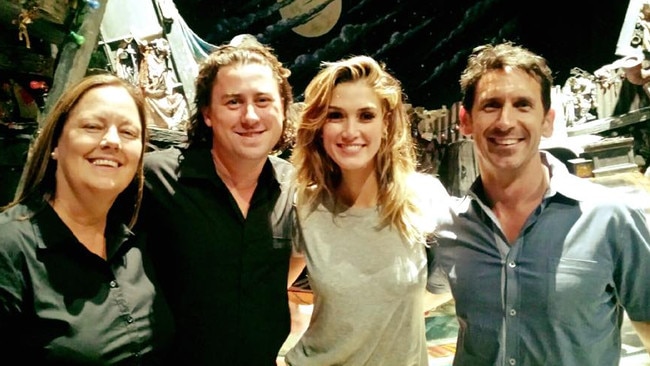
“The performers themselves appreciate having an interpreter there who’s giving an authentic interpretation, and that’s what Mikey does. I have to say there is only a handful of people like Mikey, who can actually do the interpreting … and who has that immediate presence the community responds too.’’
Webb grins describing the fun he has, feeding off the energy of both deaf and hearing audiences before him, after what can be anything from just days to months of preparation, depending on the concert or show. His favourite was the 2015 production of Cats, featuring Delta Goodrem.
“It’s breaking down barriers in general. There’s stronger bonds [between family and friends] because they’ve got the shared experience, rather than the deaf people experiencing one thing and the hearing people another. They can be there, in that moment, together.’’
EARLY AMBITION TO BECOME TRANSLATOR
Dreams of being a pilot or a vet, cruelled by colour-blindness, were swiftly replaced by a new ambition after a 16-year-old Webb and his family attended the 13th World Federation of the Deaf Congress in Brisbane, in July 1999. Under the theme Diversity and Unity, representatives of deaf communities from more than 120 countries discussed human rights, health, education, sign language, culture and arts.
“It was the most amazing thing I’d ever seen; all these interpreters on stage, interpreting in 15 different sign languages. It blew my mind and I went, that’s what I want to do.’’
Webb left school and, under the guidance of mentors Heather Loades and Barbara Eldson from the Royal South Australian Deaf Society, started work. His first gig was at a business expo, translating for deaf committee members promoting the society.
In the past 22 years the interpreting profession has grown rapidly. No two working days are the same for Webb, one of 132 accredited interpreters working with Auslan Connections, the interpreting service of Deaf Services and the Deaf Society in Queensland.
As well as press conferences, Webb and his peers can be called upon to translate a medical appointment, parent-teacher interview or conversation at a family event, to filming public education campaigns or art gallery tours. Webb’s commitments with Auslan: Stage Left are separate, regularly seeing him work with the likes of La Boite and Queensland Theatre Company.
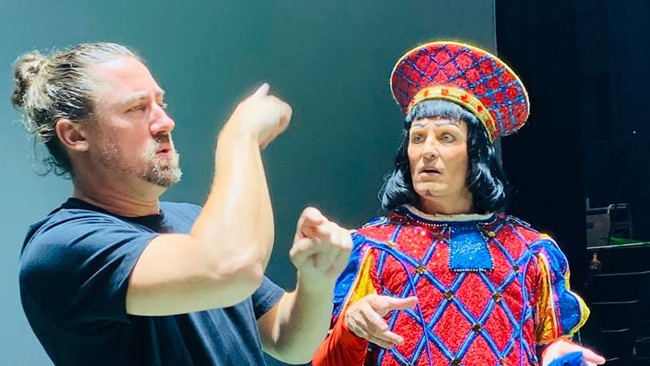
“You name it, I’ve done it. Years and years and years ago, I drove across country South Australia because a deaf farmer wanted to look at emus as potential livestock,’’ laughs Webb, a keen cross-stitcher and jigsaw puzzler, who recently completed a 32,000-piece rendition of the New York skyline with aunt Faye Webb.
Deaf Services and the Deaf Society in Queensland CEO Brett Casey says one in six Australians live with some level of hearing loss, including age-related which affects three in every four people aged 70 years or older. Aussie Deaf Kids reports one in 1000 babies are born with some form of hearing loss, about half of which is attributable to genetic causes though nine out of 10 are born to hearing parents.
Casey says the prevalence of Auslan interpreting in the news has seen a significant increase – as much as 1000 per cent in some locations - in uptake of both casual and accredited Auslan courses nationally.
“More class enrolments and a greater prevalence of Auslan in the community is a great bi-product of our interpreters and their visibility on TV, but it’s important to remember those interpreters are not there for entertainment or to advertise the language,’’ he says in a written statement. “To the deaf community, these interpreters are not celebrities but rather an invaluable and often vital source of information.’’
It rankles Webb that deafness is seen as an impairment and the community still too often misses out on vital information due to a lack of access to Auslan interpreters.
“Yes, they can’t hear. But you put a good interpreter in front of them and,’’ he snaps his fingers, “they will have the information and be able to make a decision like anyone else.’’

